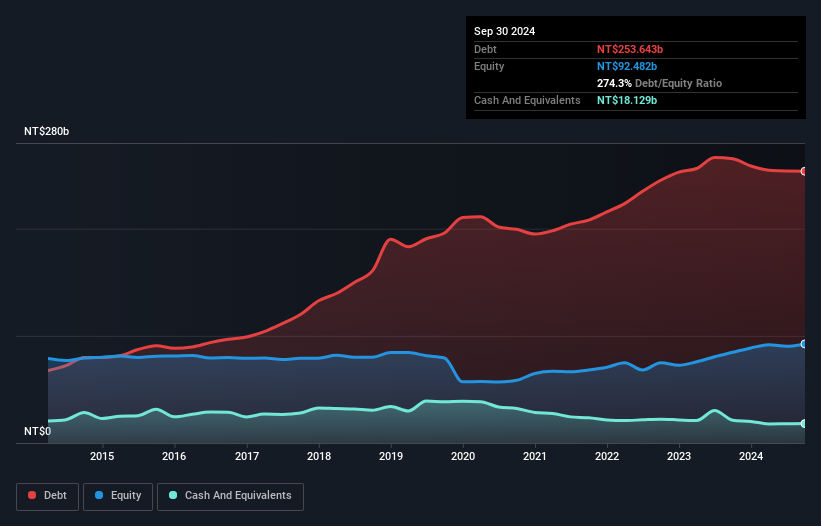David Iben put it well when he said, 'Volatility is not a risk we care about. What we care about is avoiding the permanent loss of capital.' When we think about how risky a company is, we always like to look at its use of debt, since debt overload can lead to ruin. As with many other companies Yulon Motor Company Ltd. (TWSE:2201) makes use of debt. But should shareholders be worried about its use of debt?
What Risk Does Debt Bring?
Debt assists a business until the business has trouble paying it off, either with new capital or with free cash flow. Part and parcel of capitalism is the process of 'creative destruction' where failed businesses are mercilessly liquidated by their bankers. However, a more common (but still painful) scenario is that it has to raise new equity capital at a low price, thus permanently diluting shareholders. Having said that, the most common situation is where a company manages its debt reasonably well - and to its own advantage. The first step when considering a company's debt levels is to consider its cash and debt together.
See our latest analysis for Yulon Motor
What Is Yulon Motor's Net Debt?
You can click the graphic below for the historical numbers, but it shows that Yulon Motor had NT$253.6b of debt in September 2024, down from NT$265.3b, one year before. However, it also had NT$18.1b in cash, and so its net debt is NT$235.5b.

How Strong Is Yulon Motor's Balance Sheet?
Zooming in on the latest balance sheet data, we can see that Yulon Motor had liabilities of NT$267.0b due within 12 months and liabilities of NT$25.1b due beyond that. On the other hand, it had cash of NT$18.1b and NT$238.3b worth of receivables due within a year. So it has liabilities totalling NT$35.7b more than its cash and near-term receivables, combined.
This deficit is considerable relative to its market capitalization of NT$53.1b, so it does suggest shareholders should keep an eye on Yulon Motor's use of debt. This suggests shareholders would be heavily diluted if the company needed to shore up its balance sheet in a hurry.
We measure a company's debt load relative to its earnings power by looking at its net debt divided by its earnings before interest, tax, depreciation, and amortization (EBITDA) and by calculating how easily its earnings before interest and tax (EBIT) cover its interest expense (interest cover). Thus we consider debt relative to earnings both with and without depreciation and amortization expenses.
Yulon Motor shareholders face the double whammy of a high net debt to EBITDA ratio (17.6), and fairly weak interest coverage, since EBIT is just 1.6 times the interest expense. The debt burden here is substantial. Investors should also be troubled by the fact that Yulon Motor saw its EBIT drop by 19% over the last twelve months. If that's the way things keep going handling the debt load will be like delivering hot coffees on a pogo stick. There's no doubt that we learn most about debt from the balance sheet. But it is future earnings, more than anything, that will determine Yulon Motor's ability to maintain a healthy balance sheet going forward. So if you want to see what the professionals think, you might find this free report on analyst profit forecasts to be interesting.
Finally, a business needs free cash flow to pay off debt; accounting profits just don't cut it. So it's worth checking how much of that EBIT is backed by free cash flow. During the last three years, Yulon Motor burned a lot of cash. While that may be a result of expenditure for growth, it does make the debt far more risky.
Our View
On the face of it, Yulon Motor's net debt to EBITDA left us tentative about the stock, and its conversion of EBIT to free cash flow was no more enticing than the one empty restaurant on the busiest night of the year. And even its interest cover fails to inspire much confidence. After considering the datapoints discussed, we think Yulon Motor has too much debt. While some investors love that sort of risky play, it's certainly not our cup of tea. When analysing debt levels, the balance sheet is the obvious place to start. However, not all investment risk resides within the balance sheet - far from it. We've identified 2 warning signs with Yulon Motor (at least 1 which can't be ignored) , and understanding them should be part of your investment process.
If, after all that, you're more interested in a fast growing company with a rock-solid balance sheet, then check out our list of net cash growth stocks without delay.
New: Manage All Your Stock Portfolios in One Place
We've created the ultimate portfolio companion for stock investors, and it's free.
• Connect an unlimited number of Portfolios and see your total in one currency
• Be alerted to new Warning Signs or Risks via email or mobile
• Track the Fair Value of your stocks
Have feedback on this article? Concerned about the content? Get in touch with us directly. Alternatively, email editorial-team (at) simplywallst.com.
This article by Simply Wall St is general in nature. We provide commentary based on historical data and analyst forecasts only using an unbiased methodology and our articles are not intended to be financial advice. It does not constitute a recommendation to buy or sell any stock, and does not take account of your objectives, or your financial situation. We aim to bring you long-term focused analysis driven by fundamental data. Note that our analysis may not factor in the latest price-sensitive company announcements or qualitative material. Simply Wall St has no position in any stocks mentioned.
About TWSE:2201
Yulon Motor
Manufactures and markets automobiles and related parts in Taiwan, China, and the Philippines.
Slight risk with mediocre balance sheet.
Similar Companies
Market Insights
Community Narratives



